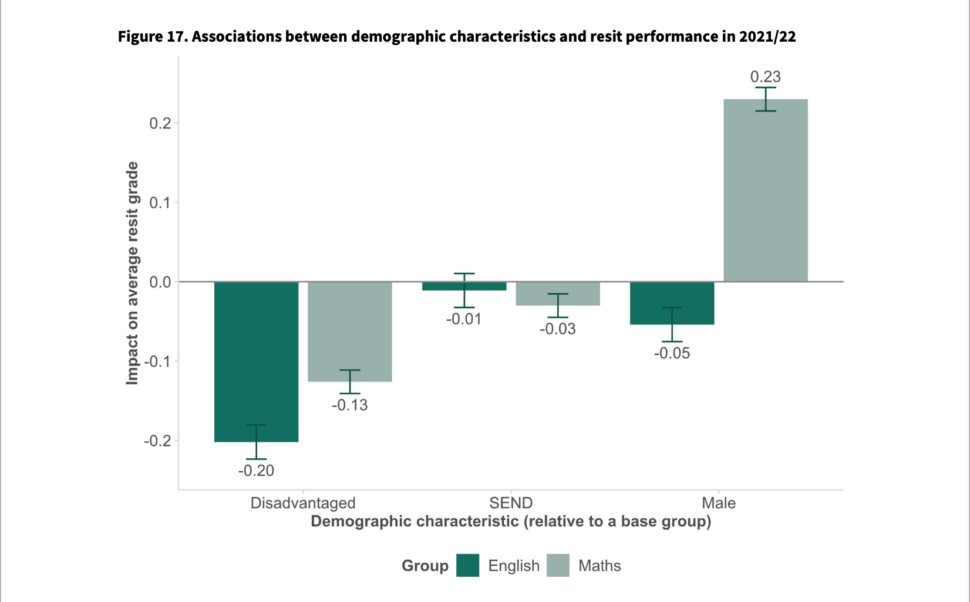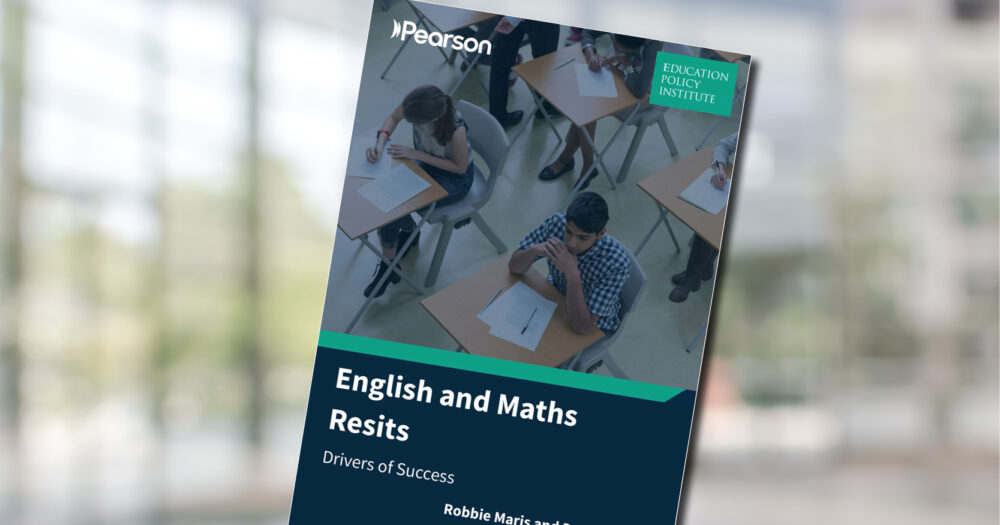Disadvantaged students fall behind by a fifth of a grade in English and one eighth of a grade in maths compared with their better-off peers when resitting GCSEs, new research shows.
Analysis by the Education Policy Institute also suggests that colleges that enter larger cohorts for resits in the quick-turnaround November series achieve lower progress on average.
And the think tank found a “cluster of top-performing institutions” in the north west of England that outperform the rest of the country when it comes to resit results, while the south west is the worst-performing region.
Ministers have been warned that “significant disparities in GCSE resit success” require “targeted reforms”, such as new “proficiency tests” for English and maths.
The research comes ahead of Becky Francis’ curriculum and assessment review final report, where English and maths resits are expected to be a central feature.
David Robinson, the EPI’s director for post-16 and skills said: “Re-examining the policy in light of the new evidence we have uncovered should enable policymakers to take more informed, targeted decisions about the future of resits.
“The benefits of securing core numeracy and literacy skills are obvious, but so too is the impact on motivation for students who feel trapped on the resit treadmill.”
‘A negative cycle of failure’
Since 2014, students who do not gain a grade 4 in English and maths at school – roughly a third of all learners – have been forced to continue to study these subjects post-16.
The policy has divided the education sector, with some claiming it creates a negative cycle of failure and has been difficult to implement given staffing and funding constraints. Others have pointed to the success the policy has had in raising attainment of English and maths by the age of 25.
Pass rates do however remain low. In the 2024 summer series, 17.4 per cent of students resitting GCSE maths achieved a grade 4, while 20.9 per cent did so in English.
Today’s EPI report, funded by Pearson, used DfE administrative records as well as the National Pupil Database and Individualised Learner Record to conduct the analysis.
The study included students who started in 2015-16, 2016-17 and 2021-22 as these are the three most recent cohorts of students whose 16 to 19 education did not take place during the Covid-19 pandemic.
EPI found a “significant disadvantage gap” in resit outcomes. On average, disadvantaged students receive 0.2 grades less than non-disadvantaged students in English and 0.13 grades less in maths, the report said.
Researchers also found that female students make “slightly more” progress in English, whilst male students make “substantially better” progress in maths, by almost a quarter of a grade.

GCSEs better than FSQs
Students who need to resit English and maths can be entered for GCSEs, level 2 functional skills qualifications (FSQs), or “stepping-stone qualifications” – usually entry-level or level 1 FSQs.
EPI found that students who initially enrol on a GCSE achieve better progress on average over their 16 to 19 study than learners on the two other options, by almost half a grade.
Anne Murdoch, senior adviser in college leadership at the Association of School and College Leaders, said this “very valuable piece of research” shows it is “time for a fundamental rethink in how we assess English and maths”.
She called for “new proficiency tests” to be developed for literacy and numeracy that “demonstrate to future employers or educators that students meet a set of pre-determined standards, while giving every young person the dignity of a qualification”.
Murdoch added. “Crucially, these tests could be taken when the student is ready, rather than being dictated by the existing resit cycles.”
November resits: good or bad?
EPI also looked into a rise in the use of November resits, which take place just months after a student was told they did not pass. Those selected for this series are usually the most likely to pass among students who scored a grade 3 at school.
Researchers found that on average, students that enter for a November resit achieve 0.60 grades higher in both maths and English.
However, colleges and schools who enter more students onto November resits “see worse results over the entirety of their 16 to 19 study”, according to EPI.
It said: “Entering every student onto a November resit (compared with no students) lowers the average individual resit outcomes by 0.26 to 0.30 grades. This suggests that taking a blanket approach to November may harm students’ overall attainment.”
North west is strongest performer
EPI also found a “significant cluster of top-performing institutions in the north west of England”.
In maths, students in the north west make 0.10 more grades progress than the average, whilst in English they make 0.11 more grades. The lowest performing region in English is the south west – 0.10 grades less than average, and in maths it is Yorkshire and the Humber – 0.06 grades less progress.
In other regions, the report said the north east does “relatively well” across both subjects and the south east “does well” in English particularly.
The south west, west midlands and Yorkshire and the Humber “do relatively worse” across both English and maths, while London “tends to fall in the middle of the distribution, alongside the east of England and the east midlands”.
EPI said it is difficult to determine why the north west performs best from the data, but from a roundtable discussion it heard there is a “large network of English and maths teachers in colleges in the north west that regularly meet to share their experiences and best practice”.
Reform accountability measures
The think tank reiterated its previous call for a 16 to 19 student premium to help address educational inequalities and widening gaps between disadvantaged and non-disadvantaged students.
It also wants government to consider reforming the 16 to 19 accountability measure for English and maths progress by “incorporating wider key stage 4 attainment”.
EPI said the research results show that prior attainment in other key stage 4 subjects “strongly predicts” resit performance, particularly for English. Accounting for this prior attainment in the English and maths progress measure “would improve the measure’s ability to capture institutional effectiveness in delivering resits”.
Colin Booth, chief executive of Luminate Education Group, which delivers over 4,000 GCSE English and maths resits each year, said: “Revealing the extent to which disadvantaged students are negatively impacted relative to their more affluent peers, this report should embolden policymakers in their efforts to reform the current post-16 resit environment.
“In the short-term, reducing the assessment burden and streamlining content could go some way to alleviating the pressure on learners. In the long-term however, it’s clear the creation of tailored English and maths GCSE qualifications, that are specifically designed for and only available to post-16 students studying vocational qualifications, is long overdue.”
A Department for Education spokesperson said: “This government has inherited a system with baked-in inequalities, but we’re determined to narrow the attainment gaps identified in this report and break down barriers to opportunity through our Plan for Change.
“That’s why we are requiring providers to teach students for a minimum number of hours, additional funding is given to support students with lower prior attainment and we provide fully-funded professional development options for English and maths teachers at level 2 and below.
“We will consider the concerns raised in this report as part of the government’s response to the curriculum and assessment review.”
















Do they have to do exams each year? That is where the issue is.
Besides, even if there were reforms, the same thing would happen; too many in education are set in their ways and will continue the cycle whichever qualification is brought in.
Many of us in Education are not set in our ways, but we are restricted by a government who only sees one kind if achievement as valid and assume that we are all ready to make that achievement at the same age. There is also a culture of “if you dont get a grade 4 you have FAILED!” That is the cycle that needs to be broken first! I have a degree in post 16 education and I teach maths, but I was not ready to achieve either of these until I was in my mid 30’s. Still got there though, just in my own time.
The reason given for the Higher performance in the North West in Maths is given as that the colleges work more closely together. It would be interesting to see also if the qualifications of the teachers were a factor?
This is why we need post 16 reform of resits GCSE English and Maths.
Have 4 sittings a year and have just 2 maths papers and the traditional 2 English papers. Get rid of the SLE for GCSE English.
Put a rule in place that only post 16 and adults can be entered.
Can you imagine a post 16 student sitting maths paper 1 in November and then sitting paper 2 in march and achieving a grade 4 combining both sittings! Grade 4 opens up so many opportunities. (Added benefit that colleges don’t need to close down 5 days every morning in the summer to facilitate 1000s of students sitting E&Ma GCSEs.
Change is eeded.